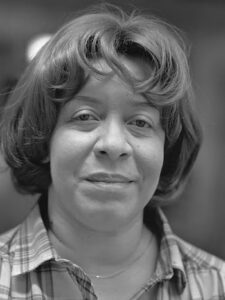
Shirley Horn, 1981
*Shirley Horn was born on this date in 1934. She was a Black jazz singer and pianist.
Shirley Valerie Horn was born and raised in Washington, D.C. Encouraged by her grandmother, Horn began piano lessons at four. At age 12, she studied piano and composition at Howard University and later graduated with a degree in classical music. Horn could have attended the Juilliard School, but her family could not afford it. Horn formed her first jazz piano trio when she was 20.
Horn's early piano influences were Erroll Garner, Oscar Peterson, and Ahmad Jamal. She became enamored with Washington's U Street jazz area, sneaking into jazz clubs before she was of legal age. In 1960, Horn recorded her first album, Embers and Ashes, which attracted the attention of jazz trumpeter Miles Davis, who praised Horn publicly and invited her to play intermission sets during his performances at the Village Vanguard. Davis's praise had resonance. A 1961 live performance recorded in St. Louis' Gaslight Square district was eventually released on LP under the title "Live" at the Village Vanguard. (A later CD reissue of this material was released under the title At the Gaslight Square 1961.)
By 1962, Mercury Records vice-president (and jazz arranger) Quincy Jones signed Horn to Mercury. On her two Mercury LPs, Horn was in a traditional pop setting with a medium-sized jazz orchestra; on neither album did she play piano. Horn's final LP of the 1960s was 1965's Travelin' Light, recorded for ABC-Paramount. She was popular with jazz critics but did not achieve significant popular success. From the late 1960s to the late 1970s, she was semi-retired from music, staying in Washington, D.C., to raise her daughter Rainy with her husband, Sheppard Deering (whom she had married in 1955) and broadly limiting her music to local performances. She made one album in 1972 for Perception Records, and Horn did not tour to promote it.
In 1978, SteepleChase Records of Denmark tracked her down and offered to record her. The resulting album, A Lazy Afternoon, was the first of four Horn albums released by SteepleChase between 1978 and 1984. Horn also began to play engagements in North America and Europe, including the North Sea Jazz Festival, where two of her albums were recorded. Horn worked with the same rhythm section for 25 years: Charles Ables (electric bass) and Steve Williams (drums). In 1986, Horn signed a one-record deal with CBS-Sony for the Japanese market and released All of Me, a studio session recorded in New York City. By early 1987, Verve Records was pursuing a recording contract with her, and in May of that year, the live album I Thought About You, her first for Verve, was recorded in Hollywood. Horn recorded one further session for an independent jazz label (1987's Softly, for Audiophile Records), then returned to Verve. She released 11 studio and live albums for Verve during her lifetime (additional compilation albums added to this total).
Horn's most commercially successful years were spent with Verve, and the label helped her find a large international audience. Miles Davis was a backup musician on Horn's 1991 album, You Won't Forget Me. Although she preferred to perform in small settings, such as her trio, she also recorded with orchestras, as on the 1992 album Here's to life, the title song of which became her signature song. Her albums Here's to Life, Light Out of Darkness (A Tribute to Ray Charles), and I Love You, Paris all reached number one on the Billboard jazz chart.
Awards and honors
Horn was nominated for nine Grammy Awards during her career, winning the Grammy Award for Best Jazz Vocal Performance at the 41st Grammy Awards for I Remember Miles, a tribute to her friend and mentor (the album's cover featuring a Miles Davis drawing of them both). She was officially recognized by the 109th U.S. Congress for "her many achievements and contributions to the world of jazz and American culture" and performed at the White House for several U.S. presidents. Horn was awarded an honorary Doctor of Music degree from the Berklee College of Music in 2002. She was awarded the National Endowment for the Arts Jazz Masters Award in 2005 (the highest honor that the United States bestows upon jazz musicians).
A breast cancer survivor, she had been battling diabetes when she died of complications from the condition, aged 71, on October 20, 2005. Since her death, concert recordings of Horn have been released on CD and DVD by Resonance Records and Image Entertainment.